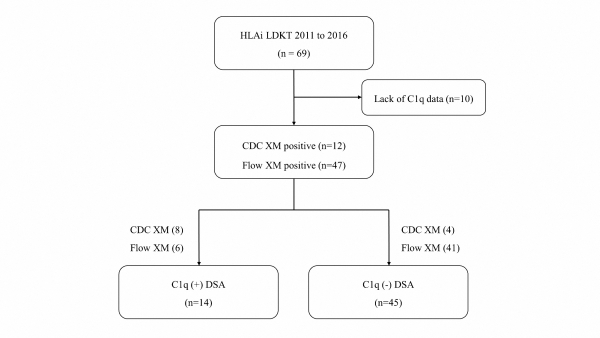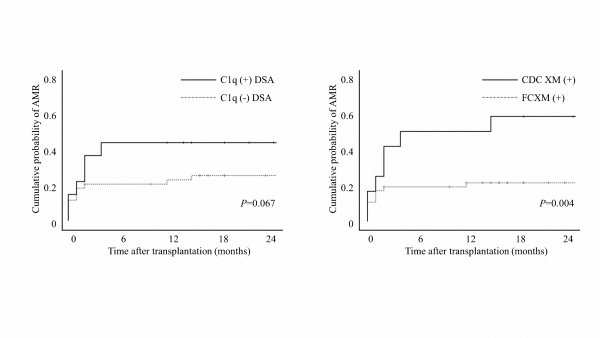The Clinical Significance of Pretransplant C1q Assay Status in Positive Crossmatch Kidney Transplantation
1Surgery, Yonsei University College of Medicine, Seoul, Korea
2Laboratory Medicine, Asan MEdical Center, Seoul, Korea
3Surgery, Ewha Womans University, School of Medicine, Seoul, Korea
4Surgery, CHA Bundang Medical Center, CHA University, Seongnam, Korea
5Internal Medicine (Nephrology), Yonsei University College of Medicine, Seoul, Korea.
Meeting: 2018 American Transplant Congress
Abstract number: A144
Keywords: Antibodies, Highly-sensitized, HLA antibodies, Kidney transplantation
Session Information
Session Name: Poster Session A: Kidney Immunosuppression: Desensitization
Session Type: Poster Session
Date: Saturday, June 2, 2018
Session Time: 5:30pm-7:30pm
 Presentation Time: 5:30pm-7:30pm
Presentation Time: 5:30pm-7:30pm
Location: Hall 4EF
Background: Patients with a pretransplant donor-specific antibodies (DSA) are at higher risk for antibody-mediated rejection (AMR). However, not all DSA have the same pathogenetic potential. The novel assay for complement binding capacity may help to stratify the risk for AMR. The aim of this study was to investigate the association between complement binding ability of DSA and clinical outcomes in patients with a positive crossmatch (XM).
Methods:We analyzed 59 patients with a positive XM who underwent living donor kidney transplantation between 2011 and 2016 with desensitization therapy (12 complement-dependent cytotoxic [CDC] XM and 47 flow cytometric XM). We analyzed clinical outcomes according to XM and C1q status.
Results: Biopsy-proven AMR developed in 18 patients (30.5%). CDC XM patients suffered more AMR than flow cytometric XM patients (P=0.004). Although the incidence of AMR was higher in C1q-positive DSA than in C1q-negative DSA, the difference was not statistically significant (P=0.067). The XM techniques and C1q positivity did no correlated with graft loss. C1q positivity was associated with higher IgG titer (11181 ± 3997 vs. 4823 ± 6132, P=0.002).
Conclusion: C1q-positive DSA in patients with positive crossmatch was unable to predict AMR, but CDC XM compared to flow cytometric XM did. The C1q binding activity in patients with positive XM largely reflects differences in antibody strength.
CITATION INFORMATION: Lee J., Kim D., Park B., Song S., Lee J., Jung Y., Lee J., Lee J., Kim B., Kim M., Kim S., Kim Y., Huh K. The Clinical Significance of Pretransplant C1q Assay Status in Positive Crossmatch Kidney Transplantation Am J Transplant. 2017;17 (suppl 3).
To cite this abstract in AMA style:
Lee J, Kim D, Park B, Song S, Lee J, Jung Y, Lee J, Lee J, Kim B, Kim M, Kim S, Kim Y, Huh K. The Clinical Significance of Pretransplant C1q Assay Status in Positive Crossmatch Kidney Transplantation [abstract]. https://atcmeetingabstracts.com/abstract/the-clinical-significance-of-pretransplant-c1q-assay-status-in-positive-crossmatch-kidney-transplantation/. Accessed February 20, 2026.« Back to 2018 American Transplant Congress


